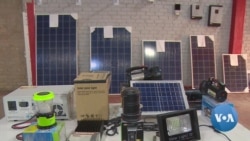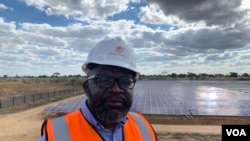The Zimbabwe government recently announced long power cuts due to low levels of water in Kariba dam on the border with Zambia – the country’s main hydropower source.
Collins Chigwagwa runs a small barbershop in a middle class suburb in Harare. Last week he bought a solar power system for about $250.
“What made me buy this solar power system are power cuts," he said. "We can go for eight hours without power or even the whole day without power. Eight hours is a whole production day yet I depend on power to get money for food and rent. So if you miss a whole day of production, it means all that money is gone."
"We used to rely on a generator during power cuts but now with fuel shortages it means more hours of looking for it and less production," he said. "So we substituted it with a solar system.”
The cleaner energy isn't within reach for many Zimbabweans. But solar power companies say business is up, and many customers are seeing the benefits of using the new power source.
"It’s actually cheaper than grid power," said Kingstone Makuwe of Genking Power Services. "People are mostly interested in back up inventors, even solar water heaters. People are actually realizing that it benefits them.”
Last week, President Emmerson Mnangagwa demoted the country's energy minister due to fuel shortages and power cuts. Monday, officials said Harare is asking the public for possible long-term solutions.
CentralGrid a private company located about 50 kilometers northwest of Harare, is working to build a solar power plant to help feed into the national grid. It has installed about 7,000 solar panels as it works to build a 25 megawatt plant.
The company has invested $5 million and needs $25 million more. Company founder Victor Utedzi says a problem accessing foreign currency is slowing development.
“As you can see almost 80 to 90 percent of all the components are imported," he said. "But once you have that access to foreign currency, solar is quick to install, solar is easy to maintain. So it is really something needed for the country, but it is the issue of foreign currency access that is very important for the development of this power plant.”
For now most Zimbabweans continue to endure long periods without power, a chronic problem analysts say it costing millions each day in lost productivity.








